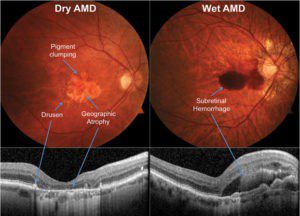Courtesy of Personalized Retina Care of Naples


Signs & Symptoms of Macular Degeneration
1. No Symptoms. In the early stages, there may be little to no symptoms
2. Changes in vision may start to become more noticeable
3. Mild to severe blurred vision or distorted lines and shapes may occur
4. Central vision loss
5. Hole in vision that appears dark or with whiteout
6. Loss of vision
In adults over the age of 50, age-related macular degeneration (AMD) is the leading cause of blindness. It is estimated that more than 10 million Americans have some degree of AMD, and unfortunately, there is still no cure for the disease. But there are several treatment options available to this disease that once relentlessly lead to legal blindness.
In AMD, the macula becomes damaged, leading to loss of vision, distortion or the appearance of blind spots in central vision. Although it is a very complex disease and still not completely understood, it can be brought on by both hereditary and environmental factors.
Wet & Dry Macular Degeneration
There are two main types of AMD, wet and dry. Typically, AMD starts as the dry type and may progress into the wet form of the disease. Dry macular degeneration is the most common form of the disorder. In some cases, yellowish deposits (drusen) adhere to the retina, just under the macula. Drusen can weaken and deteriorate the macula causing affecting it in various degrees, including severe central vision loss and blindness.
Wet macular degeneration happens to about 10 to 20% of the individuals that have dry AMD and is usually caused by blood vessels that leak fluid or blood into the macula. It causes blind spots, blurry vision, and unfortunately rapidly escalates to vision loss.
Macular degeneration has several therapies that prevent the disease from progressing. One of the main treatments is anti-VEGF (anti-vascular endothelial growth factor) intraocular injections.
Dr. Taba, Ophthalmologist, and Retina Specialist explains, “In a National Eye Institute (NEI) study, researchers concluded that before the anti-VEGF injections, 2/3 of wet macular degeneration patients went legally blind within two years of diagnosis. Now, we are able to keep vision 20/40 or better in half of our patients. This reduction reflects on a 20% decrease in long term facilities admission, likely since elderly patients are not going legally blind.”
The conclusion of the study confirmed that anti-
VEGF injections are a significant long-term therapeutic advance for neovascular AMD and it was effective at decreasing blindness and the progression of the disease.1
Dr. Taba also warns that all these vision changes are painless. She says “Macular degeneration comes unannounced and can take away your vision”. There are no warnng signs such as tearing or pink eye. Vision just starts becoming cloudy and distorted. And if occurs silently usually affecting one eye at a time, so with both eyes open, those changes can go undetected.
If you are experiencing any changes in your eye health, whether it is blurry vision, pain, impaired vision, or any other visual irregularities, it is imperative that you see an ophthalmologist right away. The earlier disease or disorders are detected, specially in macular degeneration, the better the outcome and treatment options are for you.
Personalized Retina Care of Naples provides incomparable diagnosis, medical and surgical treatment for retinal conditions and disorders. Dr. Taba is a Board-
Certified Ophthalmologist and is Fellowship trained in surgical and medical retinal diseases.
There are ways to regain your independence and correct low vision. To find out more, or to schedule your appointment, please call (239) 325-3970 today.
Dr. Katia Taba— Personalized Retina Care of Naples
Katia Taba, MD, is the board-certified ophthalmologist and retina specialist at Personalized Retina Care of Naples in Naples, Florida. Dr. Taba treats macular degeneration, diabetic retinopathy, eye floaters and flashes, and other serious eye problems that can interfere with sight or steal vision without treatment. Patients know Dr. Taba as an extremely friendly and welcoming care provider who maintains great professionalism at all times.
Dr. Taba wants to make sure that patients always get the most accurate diagnosis and most effective treatment, so she uses only the latest, state-of-the-art diagnostic equipment. Dr. Taba is the first retina specialist on the southwest coast of Florida to have wide-angle viewing imaging with fluorescein angiography. Dr. Taba also makes sure that injections and treatments are pain-free so patients can always expect a comfortable experience.
Personalized Retina Care of Naples
For more information, please visit
www.retinanaples.com, or call our office at
239-325-3970.
3467 Pine Ridge Road Suite 103
Naples 34109
References:
1. C Wykoff, MD, “5-year CATT data reveal strengths, limitations of anti-
VEGF therapy.”, 2016, American Academy of Ophthalmology, aao.org
 Southwest Florida's Health and Wellness Magazine Health and Wellness Articles
Southwest Florida's Health and Wellness Magazine Health and Wellness Articles
